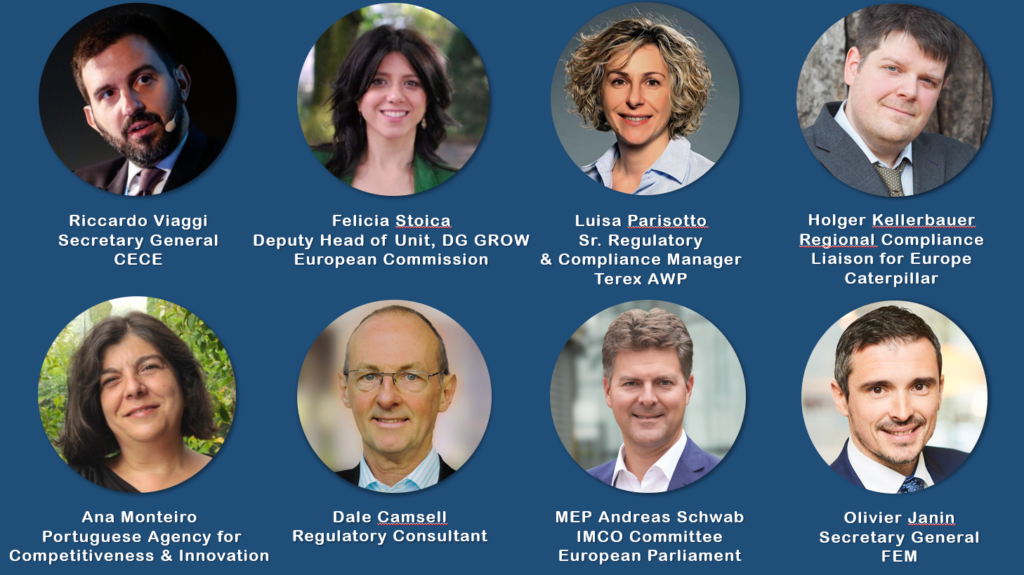Moderated by Dale Camsell, Regulatory Consultant, and with an exciting line-up of speakers, CECE Secretary General, Riccardo Viaggi, kicked off the discussion and set the scene reminding participants that we must not lose sight of what is at stake for ‘’one of the most competitive and prosperous industrial sectors of Europe’’. It is an industry worth 660 billion Euro with roughly 83,000 companies, employing 3 million people. As one of the largest net exporters of Europe, representing 36% of the global market share, the machinery industry will be directly impacted by this revision process.
In providing concrete insights into this process, Felicia Stoica, Deputy Head of Unit, DG GROW, shared objectives and what to expect from the new Directive. In adapting to emerging technologies, she stated the Directive needs to be ‘’beefed up’’ in regard to how it addresses and adapts to emerging innovative technologies and ensure greater legal clarity in scope and definitions.
Switching to an industry focus, Luisa Parisotto, FEM Board member and Senior Regulatory and Compliance Manager at Terex AWP and Holger Kellerbauer, Regional Compliance Liaison for Europe at Caterpillar, shared their thoughts from an industry perspective.
Voicing support for the Directive in its current form, Luisa highlighted a longstanding positive experience stemming from its ability to accommodate digital innovations whilst ensuring the safety of machines, a level playing field and a simplified procedure for compliance and harmonisation across the EU. She called for the Directive’s flexibility and resilience to be maintained and its positive elements to be preserved with no new unnecessary burdens being introduced.
As one of the most controversial topics in the discussion, Luisa and Holger both voiced the need for the Directive to remain technology-neutral to allow it to address all technologies that emerge, remaining future proof, with Holger stating that technology specific legislation tends to be over prescriptive, hampering innovation, particularly for a wide range of applications such as those covered by the Machinery Directive.
Ana Montiero, representing the Portuguese Agency for Competitiveness and Innovation at the Directorate for Enterprise and Policy, shared her thoughts from a Member State’s point of view. Delving into different aspects of the Directive, Ana took participants through its strengths, weaknesses, and opportunities and risks, citing the the need for stable data to characterise any pending risks posed by innovative technologies.
Last but certainly not least, MEP Andreas Schwab, member of the IMCO Committee, described the safety and reliability of all technologies, including new and emerging ones, as the overall objective of the legislation. The overarching goal being to find the right structure to achieve this, while avoiding too much red tape.
Recognising that the current directive has already been used for new technologies, he continued by stating that it is important to reflect this in the revision process, while also taking into account the developments of the next decade.
Closing the discussion, Olivier Janin, Secretary General of FEM, reiterated the importance of the Machinery Directive for manufacturers, citing its success over the past years in enabling innovation and competitiveness whilst fostering safety, and the need to preserve this in equal amounts going forward. Regarding digital technologies, Olivier urged decision-makers not to introduce new requirements on the basis of a ‘fear of the unknown’.
Despite this discussion highlighting almost equal diverging opinions among participants when asked whether they believe the Directive is currently flexible and resilient enough to handle digital innovation, in looking ahead, CECE and FEM, as stated by Olivier, ‘’hope that the new directive will be as successful as the current one.’’
Download the presentation slides.
If you have any questions, please contact FEM at info@FEM-EUR.eu and CECE at info@cece.eu.


